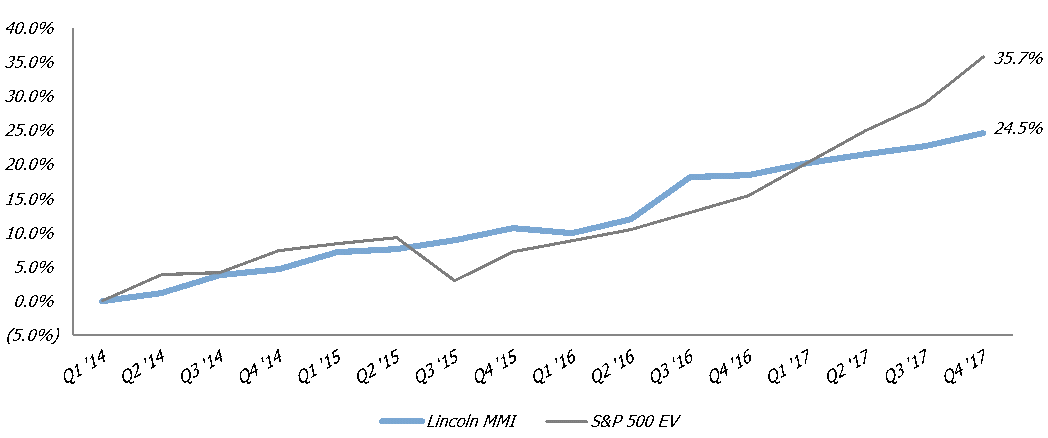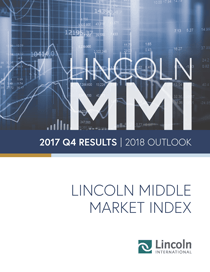Lincoln International’s Middle Market Index Shows Continued Private Market Growth and Trends
Index Enhanced to Include Industry Sub-indices
Lincoln International, a leading global, mid-market investment bank, today released the second issue of its Lincoln Middle Market Index (Lincoln MMI), which covers data from Q4 2017. In addition, this is the first time Lincoln has released sub-indices for each industry that comprise the Lincoln MMI.
Lincoln International’s second issue of the Lincoln MMI reveals that, in Q4 2017, middle market enterprise values increased 1.5% compared to 5.3% for enterprise values of S&P 500 companies.
“The Lincoln MMI provides useful and differentiated insights into the risk and return attributes of private equity owned companies,” said Steve Kaplan, Neubauer Distinguished Service Professor of Entrepreneurship and Finance at the University of Chicago Booth School of Business, who assists and advises Lincoln about the index. “This quarter, private equity backed companies continued to exhibit positive risk and return performance in the fourth quarter. Both the public and private markets generated strong returns likely due to earnings growth and the expectation of lower taxes in the future.”
Ron Kahn, Managing Director and head of Lincoln’s Valuations & Opinions Group added, “The recent enactment of the tax reform bill will increase after tax cash flows which could potentially result in increases in enterprise values by approximately five to ten percent. However, while the impact of tax reform was immediately evidenced in public company valuations, the effect on private companies has yet to materialize as buyers and sellers continue to evaluate the ramification of this law.”
Key Market Observations:
- The Lincoln MMI has historically performed similarly to the public equity markets; however, beginning in the second half of 2017, enterprise values of public equities have increased at greater rates than the private middle market.
- The Lincoln MMI continues to demonstrate that the U.S. middle market is less volatile than the enterprise values of the S&P 500.
- Confirming empirical studies and despite multiple expansion in Q4 2017, earnings growth remained the largest driver of enterprise value change in the Lincoln MMI.
Industry Sub-indices & Key Observations:
For the first time, Lincoln has released sub-indices for each industry that comprise the Lincoln MMI. Led by the technology sector, every industry except for consumer showed enterprise value growth in Q4 2017.
- The consumer sector was the only industry to experience aggregate enterprise value declines during Q4 2017, reflecting pressures in the retail and restaurant segments.
- Since Q1 2014, healthcare has been the strongest performing industry in the Lincoln MMI driven primarily by outsized returns in late 2014 and early 2015.
- Energy enterprise values declined in the middle market in 2015-2016 reflecting the impact of lower oil and gas commodity prices; however, energy valuations have stabilized since mid-2016.
About the Lincoln Middle Market Index
The Lincoln MMI is the only index that tracks changes in the enterprise value of U.S. privately held middle market companies, primarily owned by private equity firms.
The Lincoln MMI seeks to measure the variation in middle market companies’ enterprise values by analyzing the aggregate change in both company earnings as well as the prevailing market multiples of approximately 350 middle market companies each generating less than $100 million in annual earnings. The Index is calculated using anonymized data on an aggregated basis by Lincoln’s Valuations & Opinions Group, and contains distinctive views into the financial performance of thousands of portfolio investments of financial sponsors, business development companies and private debt funds.
The methodology was determined by Lincoln in collaboration with Professors Steven Kaplan and Michael Minnis of the University of Chicago Booth School of Business. While other indices track changes to a company’s revenue or earnings, the Lincoln MMI is different in that it tracks the total value of these companies. Significantly, the large number of middle market companies used to create the Lincoln MMI helps ensure that the confidentiality of all company-specific information used in the Index is maintained.
Starting with a benchmark value of 10,000 as of March 31, 2014, the Lincoln MMI has increased to 12,455 as of December 31, 2017, resulting in an annual compounded growth rate of 6.0 percent per year since inception.
Relationship of the Lincoln MMI to the S&P 500
 (Note: Both the Lincoln MMI and S&P 500 EV returns above reflect enterprise values)
(Note: Both the Lincoln MMI and S&P 500 EV returns above reflect enterprise values)
Important Disclosure
The Lincoln Middle Market Index is an informational indicator only, and does not constitute investment advice or an offer to sell or a solicitation to buy any security. It is not possible to directly invest in the Lincoln Middle Market Index. Some of the statements above contain opinions based upon certain assumptions regarding the data used to create the Lincoln Middle Market Index, and these opinions and assumptions may prove incorrect. Actual results could vary materially from those implied or expressed in such statements for any reason. The Lincoln Middle Market Index has been created on the basis of information provided by third-party sources that are believed to be reliable, but Lincoln International has not conducted an independent verification of such information. Lincoln International makes no warranty or representation as to the accuracy or completeness of such third-party information.
Summary
-
Lincoln International's Middle Market Index (Lincoln MMI) reports middle market company performance in Q4 2017.
- Click here to download the full LMMI report
Meet our Senior Team in Valuations & Opinions

I find immense fulfillment in enabling clients to achieve their objectives and navigate the complexities of today's ever-changing landscape.
Chris Croft
Managing Director & Co-head of Transaction Opinions
New York
I enjoy sharing insights about market and valuation trends with my clients, while also leading a differentiated and high-touch process.
Brian Garfield
Managing Director & Head of U.S. Portfolio Valuations
New York
I enhance my clients’ decision making and governance processes by providing independent and objective financial advice in a highly responsive manner.
Chris Gregory
Managing Director & Co-head of Transaction Opinions
New York
I enjoy the opportunity to provide clients with insightful and unbiased advice that will help them make the most informed decisions possible.
Ron Kahn
Managing Director & Global Co-head of Valuations & Opinions
Chicago








